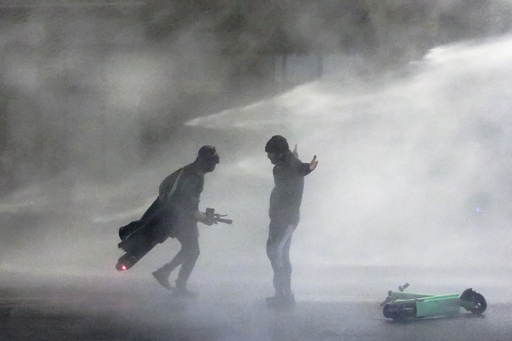TBILISI, Georgia — Political turmoil has resurfaced in Georgia following the parliamentary elections, which many critics labeled as fraudulent. The pro-Moscow government has now taken the controversial step of pausing its negotiations to join the European Union, further deepening the unrest within the country. This small yet historically significant nation, situated at the crossroads of Slavic, Turkish, and Persian cultures, is currently navigating a complex geopolitical landscape dominated by a tense standoff between Russia, led by President Vladimir Putin, and the democratic West.
Recent parliamentary elections held on October 26 resulted in a victory for the ruling Georgian Dream party, a political entity established by Bidzina Ivanishvili, a billionaire with a controversial history tied to Russia. Despite official election results, public opinion remains clear; numerous polls indicate that a significant majority of Georgians aspire for their country to join the European Union. This desire has manifested in a series of robust protests against the government’s decision to halt the EU accession process, leading to the detention of over 200 individuals following four nights of demonstrations in the capital city of Tbilisi. The turnout for these protests has been notable, involving tens of thousands of participants in a nation of approximately 3.7 million residents.
While the legislative body remains under the control of Georgian Dream, President Salome Zourabichvili, whose role is mainly ceremonial, has voiced her concerns regarding the government’s response to the protests. She has publicly condemned the ruling party’s crackdown on free speech and reported that numerous detained demonstrators showed visible signs of injury.
The situation in Georgia draws comparisons with earlier protests in Ukraine as that country sought closer ties with the West. The Georgian government’s choice to suspend its pathway to EU membership comes on the heels of a European Parliament resolution that denounced the recent elections as neither free nor fair. Dmitry Peskov, spokesman for Putin, has remarked that Moscow perceives the unfolding events in Georgia as reminiscent of the political upheaval in Ukraine during 2013 and 2014. This chaos was triggered when a pro-Russian president opted against signing an association agreement with the EU, ultimately leading to his flight from the country amidst growing unrest.
Like Ukraine, Georgia has ambitions of joining the NATO military alliance, a move that Russia opposes as it seeks to maintain its influence over former Soviet territories. Georgia shares a lengthy border with Russia, although it does not touch any EU nations, save for a boundary with NATO member Turkey.
In August 2008, tensions escalated into a brief war when Georgia made an ill-fated attempt to reclaim its separatist region of South Ossetia. In the aftermath of that conflict, Moscow recognized the independence of South Ossetia and Abkhazia, establishing military bases in both areas.
As the protests continued to gain momentum, U.S. and EU officials have worked to apply greater pressure on the Georgian government. Recently, the U.S. State Department publicly condemned the decision to suspend EU accession efforts, declaring an end to its strategic partnership with the nation. Last December, Georgia achieved candidate status with the EU, contingent upon meeting stringent entry criteria. However, this spring, prospects for its accession were jeopardized when the Georgian parliament approved a contentious “foreign influence” law, viewed as a severe restriction on democratic freedoms, prompting the EU to withhold financial support and pause Georgia’s EU ambitions.


